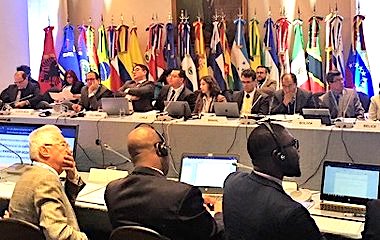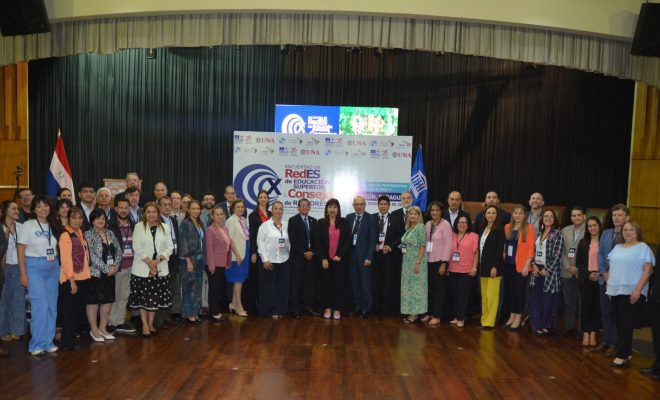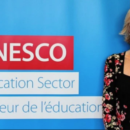Francesc Pedró: “The configuration of the teaching career itself does not sufficiently consider, beyond its seniority, the excellence of the teaching staff”

Temperatures have synchronised despite the distance that separates us, 6,990 kilometres. In spring weather, here and also in Caracas (Venezuela), I talk with my next guest, Francesc Pedró, Director of UNESCO IESALC, since 2019, about educational policies, but above all, about teaching.
A lively and calm speaker, Pedró (Barcelona, 1960) graduated in Education at the Universitat Autònoma de Barcelona and obtained a PhD with a thesis on Comparative Education at the UNED (Madrid). Subsequently, he undertook postdoctoral studies in Comparative Public Policy at the Institute of Education, University of London (UK). As Professor of Comparative Education Policy in the Department of Political Science at the Universitat Pompeu Fabra (Barcelona) he was in charge of the direction of its quality programme. Previously he was Vice-Rector for Educational Research and Innovation at the Universitat Oberta de Catalunya (Barcelona).
I always like interviewees to talk about their personal and professional background. In the case of Francesc Pedró, what has been your life’s trajectory?
For the last five years, I have been at the forefront of Unesco’s International Institute for Higher Education. Unesco has eight international institutes and I have the honour of running one of them, which deals exclusively with issues related to this stage of education. Previously, I worked in other organisations such as the OECD, in the research centre and in UNESCO itself, always related to education policy. However, I have spent most of my professional career as a university lecturer. I have a chair at Pompeu Fabra University in Education Policy and, when I can, I would like to return to research and the classroom.
The headquarters of the institute and your work are in Caracas. How do you see education in Latin America from there?
The Latin American region is very heterogeneous in terms of education, marked by enormous economic and social inequalities that are strongly reflected in the education sector. The quality deficits are also notable. You can find schools at an above-average international level, which are a minority, and then the majority of schools that are a reflection of these unequal societies and economies. As countries increase their middle classes, so does the desire for higher quality education and the economic effort needed to achieve it, as public investment in compulsory education is far from what is expected in the current socio-economic context.
In Venezuela, the situation is critical. It is surprising to see that schools continue to operate with teacher salaries that are barely enough to subsist on. There are constant conflicts in the streets with teachers’ representatives. There is a major breakdown of public provision, particularly public education in this country.
My experience, travelling in these countries, is that the damage of the pandemic is very evident. I have visited schools where children in the 3rd grade of primary school cannot read or write. Do you think it will be possible to overcome the effects of the pandemic?
The impact of the pandemic translates into the loss of just over a year of schooling in many cases. We have calculated the impact in terms of labour markets of these learning losses and the strain on schools, which have to continue working as if everything is back to normal, when in reality there are very significant learning deficits. It is difficult for this situation to be resolved in one or two years’ time. These learning losses are likely to drag on for a long time and will be felt especially in the transitional grades.
Paradoxically, at the institute, where we work exclusively on higher education issues, we are about to release a report that shows that there was a non-negligible percentage of students who learned more during the pandemic than they would have if they had attended university classes, thanks to the right properties, university centres that curated the content, motivated professors and a social context conducive to taking advantage of the opportunity. This is a wake-up call for the traditional university system. For most university students, however, it was a time of no learning or learning from extreme needs.
At UNESCO, we highlight the opportunities for young female students, as the pandemic meant for many of them a return to patriarchal structures that hardly left room for them to learn and develop in gender-equitable conditions. This confirms that there is a very important gap that probably only time and good will on the part of teachers can fill, if they accept that their job is to contribute to the recovery of learning with appropriate pedagogical tools and time to implement individualisation.
Do you think that the technological acceleration that occurred out of necessity during the pandemic has brought progress or, on the contrary, may have a boomerang effect that will make us feel obliged to go backwards in its use?
The taste left after the pandemic is bittersweet. Technology is welcome if we have the skills and conditions to take advantage of it, but those skills and conditions are by definition not yet in place. Technology used in the classroom, inappropriately or without the necessary pedagogical skills and resources, can be counterproductive. I do not think that this is anathema to the use of technology in educational processes, but rather the need to find appropriate rational ways to optimise it.
What is missing is what I consider to be the key element: teacher training centres, particularly initial teacher training centres and faculties of education, must become educational vanguards, driving forces in education. The future teacher has to experience first-hand what quality education with equity must be like in the 21st century. If the training centres do not achieve this experience, they become transmission belts for traditional pedagogies, disguised with a progressive discourse.
Thinking about Higher Education, in general, the feeling that exists is that in universities the prestige of research takes precedence over teaching and there is little demand on the quality of teaching staff in higher education compared to the value placed on publications.
In the global south, including Latin America, around 85% of so-called universities do not have a current budget for research. Reality far outweighs fiction, because one thing is the installed thinking and discourse that every university teacher has to be a good researcher above all else, and quite another is the real opportunities that exist in the global south for university teachers to have the resources to carry out research. As a result, very little research is produced in the global south, only in a few universities, and in many cases in specific niches, but with an extreme dependence on the global north.
University prestige comes above all from their ability to publish in recognised journals. However, the ability to publish in indexed journals is very low in the global south, unlike in the north, where university careers are based on research achievements. I am not aware of any system in higher education where compensation mechanisms can overcome this situation.
Are there any successful experiences from which we can draw inspiration?
We need to move towards the recognition of teacher training as professional training. The configuration of the teaching career itself does not sufficiently consider, beyond seniority, teaching excellence. If the system does not recognise it, it is difficult for us to place these exceptional professionals as a point of reference for what we can achieve under current conditions.
There are countries that recognise in the teaching career not only the stages derived from seniority but also those derived from the public recognition of that professional excellence by the school community itself, with designations such as “recognised teacher”. What the system must achieve is that a good primary school teacher remains at this stage, happy, satisfied and recognised, exerting a pull effect on the majority of teachers. This has to do with the teaching career and with recognition by the school itself. The development of the skills of each and every teacher has to be led by people to whom we recognise that professional authority.
To do all this would require a performance system in a profession that, despite spending most of its time on evaluation, is allergic to being evaluated.
This aversion to evaluation stems in part from our drive to achieve systemic change overnight. We should start by providing opportunities for those schools that want to innovate and evaluate to do so. Educational change, when it comes, comes from the bottom up, and what the policy environment should be doing is basically suggesting the elements for the context in which schools work to recognise good achievements, rather than telling them what to do. Enable that innovation in the expectation that there will always be a return.
Artificial Intelligence is accelerating the ways of approaching teaching and learning processes or assessment processes.
Artificial intelligence is accelerating the ways in which we approach teaching and learning processes or assessment processes. It is still difficult to detect which models can inspire us to have teaching that does not turn a deaf ear to a changing reality that shows that the work and assignments that I did for my students twenty years ago, I cannot do now. Simply because they will not be done by the students but by the tools. I have to look at how course design takes advantage of that reality and gets them used to working in an appropriate way in a much richer context of tools. If I have to think about what legacy I want to pass on to generations of young professionals, I have to teach them to grow up in an environment where they learn to navigate those tools. Rather than worrying, I am very excited and, at the same time, very cautious, because I am lost.
I know less about higher education, but it is true that there seems to be an avalanche of new accreditations, hybrid universities, etc. Where is the organisation of the university heading?
The changes in higher education are more evident on the provision side, where there is a great deal of investment in the use of platforms and new paradigms. The secret lies in finding formulas that allow for greater flexibility. But, from the demand side, apart from the prototypical flexibility of participants in postgraduate courses, doctorates, masters and so on, it is really the social environment that determines that students aged 18 to 24 look for training offers that guarantee them entry into the labour market with the minimum effort, in terms of the duration of the training.
The whole discussion on micro-credentials, from the demand side, is closely related to an economic and labour system that does not really seek to train citizens in higher education, while at the same time generating professionals with market value. Emphasising short-term employability basically reduces the role of higher education to that of a provider of skills that have a labour value today but may not have any tomorrow. The idea of micro-credentials, which is what young people want today, in a colloquial phrase would be: “bread for today and hunger for tomorrow”. Unless we are able to create a flexible offer that allows micro-credentials to stack up in a way that makes sense, most young people are tempted to find training to fill jobs that exist today instead of worrying about their future. They don’t realise, and I don’t think the institutions and certain international bodies do either, that when they talk about education, they are, at heart, talking about employability. Of course, all of us depend on our jobs, but from Unesco, I aspire to think that above all we are human beings, that for many years we are going to have to have a job because otherwise we will not survive, but we are not only employees but, above all, citizens.
I usually end my interviews by asking the interviewees for a message for teachers, but in your case, I am going to ask you for the students, future teachers, who are today in universities in Spanish-speaking countries, which is the target audience of the magazine.
The countries of Latin America need young generations who see teaching as much more than a job or a secure occupation. They need to see that commitment as an element of social change to make the world more sustainable. I invite them to explore whatever tools they have at their disposal, to dare to make mistakes in teaching and to easily identify those teachers who are passionate about the art of teaching and providing learning opportunities so that they can learn the best lessons from them. Any teacher who is deeply committed is happy to share and, fortunately, in Latin America we have many examples of success in this regard. We just have to go out and find them.
Thank you Francesc, it has been a pleasure talking to you.
Thanks to you.
By Carmen Pellicer, Director at Cuadernos de Pedagogía.
Free version translated from the original La configuración de la propia carrera docente no considera suficientemente, más allá de la antigüedad, la excelencia del profesorado, on Cuadernos de Pedagogía, Nº 555.
RELATED ITEMS








